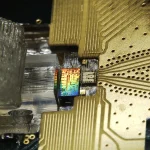Quantum computers are soon expected to have the capability of breaking current (mathematical) encryption methods. Considering the ever-increasing cyber attacks, a new paradigm for IT security is required, and the scientific community is actively working on practical solutions.
QKD aims at securing data communication using the laws of quantum mechanics, relying on the “no-cloning theorem”, which states that quantum mechanical states cannot be copied, and allows for a new level of security in digital communication.
 The vision is that a QKD-encrypted network could serve as the backbone for a quantum internet, providing long-distance connections between quantum devices like quantum computers and quantum sensors.
The vision is that a QKD-encrypted network could serve as the backbone for a quantum internet, providing long-distance connections between quantum devices like quantum computers and quantum sensors.
The project, launched in January 2023, aims at establishing a quantum-secure communication testbed in Belgium, to allow private and public institutions to get familiar with the unavoidable future of digital communication.
The project also sponsors selected research lines in academic institutions. The aim is to leverage the strengths of the Belgium research landscape to overcome the challenges of current QKD technology such as excessive costs or lack of scalability.
The first QKD link, connecting two campuses of Ghent University, will be used mainly for research purposes.
A second link connects Redu and Transinne and will be used by the European Space Agency together with the Centre d’Excellence en Technologies de l’Information et de la Communication (CETIC) to secure IOT data transfer.
Finally, a third link, connecting two datacenters of Belnet, will be used for internal secure data transfer.
